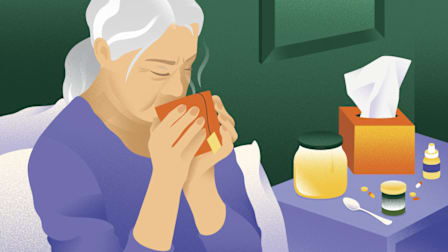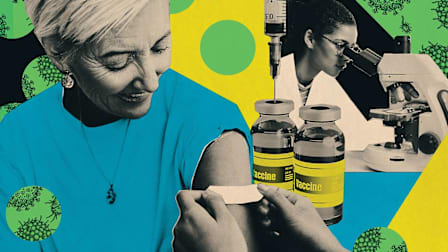What You Can Do Now That You're Vaccinated Against COVID-19
New CDC guidance says vaccinated people can travel and safely visit one another indoors without masks or social distancing

If you’re already fully vaccinated against COVID-19 or will be soon, go ahead and book that summer vacation. The Centers for Disease Control and Prevention announced today that fully vaccinated people can travel—both domestically and internationally—with few limitations.
This advice builds on guidance the CDC issued in early March, which cleared the way for fully vaccinated people to safely gather indoors and unmasked without physical distancing with small groups of other fully vaccinated people. Visits between vaccinated people and a small number of low-risk unvaccinated people from a single household are also acceptable.
As a result, fully vaccinated grandparents, for example, can travel to see their unvaccinated children and grandchildren, and hug them as long as none of the unvaccinated people are at risk of severe COVID-19 because of factors such as heart disease, pregnancy, and obesity.
Guidelines for Travel
The new guidelines reflect the latest evidence and science on the real-world effects of vaccination, the CDC said in a statement. The risk to a fully vaccinated person from traveling is low.
People are considered fully vaccinated two weeks after they’ve received their last required vaccine dose—after a second dose of the Moderna or Pfizer-BioNTech vaccine, or after one dose of the Johnson & Johnson vaccine. At that point, according to the CDC, people are much less likely to develop symptoms of COVID-19 and may be less likely to spread the SARS-CoV-2 virus that causes COVID-19 to others.
“With millions of Americans getting vaccinated every day, it is important to update the public on the latest science about what fully vaccinated people can do safely now, including guidance on safe travel,” the CDC’s director, Rochelle Walensky, MD, said in a statement. “Vaccines can help us return to the things we love about life, so we encourage every American to get vaccinated as soon as they have the opportunity.”
According to the CDC, for travel within the U.S., you don’t need to be tested for COVID-19 before or after your trip, or to self-quarantine after your return, provided you take the standard precautions while traveling: Wear a mask, practice social distancing, avoid crowds, and wash your hands frequently.
The situation for international travel is slightly more restrictive because of the possibility of spreading variants of the virus and the differences in disease rates and vaccine status in other countries.
The CDC says you don’t need to get a COVID-19 test before going abroad unless the area you’re visiting requires one. But you must be tested and have a negative result before you fly back to the U.S. Self-quarantining post-trip isn’t necessary unless your state and city require it. But you should get tested again three to five days after you return. The same COVID-19 precautions apply throughout your trip.
The CDC’s travel advice hasn’t changed for people who aren’t fully vaccinated. Those traveling within the U.S. should be tested one to three days before their trip and again three to five days after travel. Even if the test is negative, you should stay home for seven days (10 days if you don’t get tested). The CDC advises unvaccinated people to avoid international travel.
Heading Back to Normal
For many people who have spent the past year avoiding contact with friends and family outside their household bubble, the new guidance is a sign that though precautions are still needed, there’s an end in sight to at least some restrictions.
“This is a step toward normalcy for those who have been vaccinated,” says Gregory Poland, MD, a professor of medicine who studies vaccine response in adults and children, and directs the Vaccine Research Group at the Mayo Clinic.
This guidance may also help demonstrate the benefits of getting fully vaccinated against COVID-19 once vaccines are readily available to all.
Editor’s Note: This article was updated to include information about travel guidance. It was originally published March 8, 2021.




